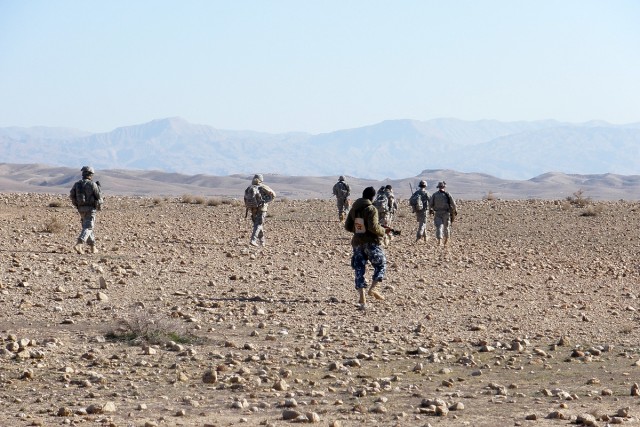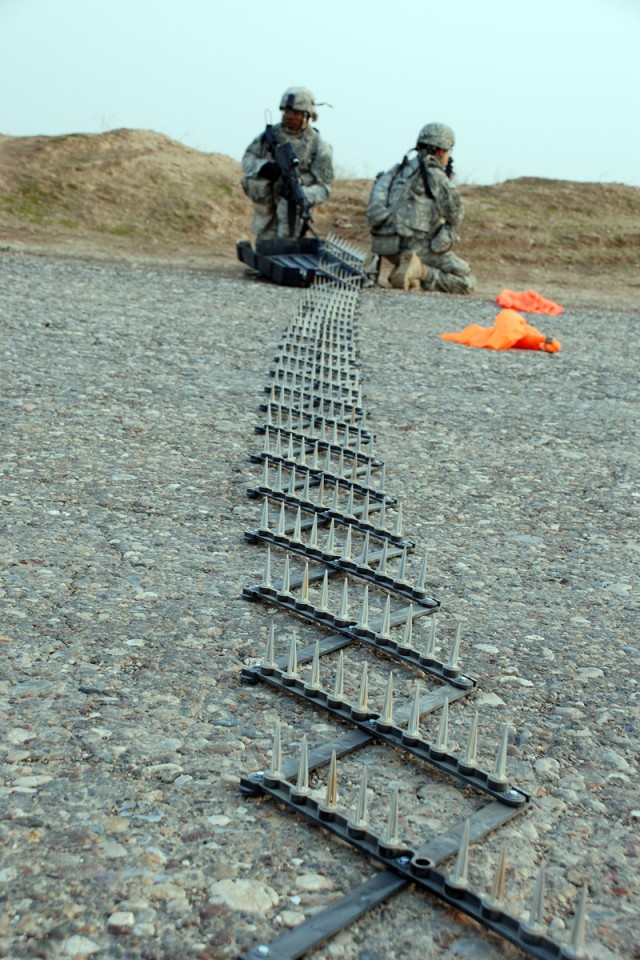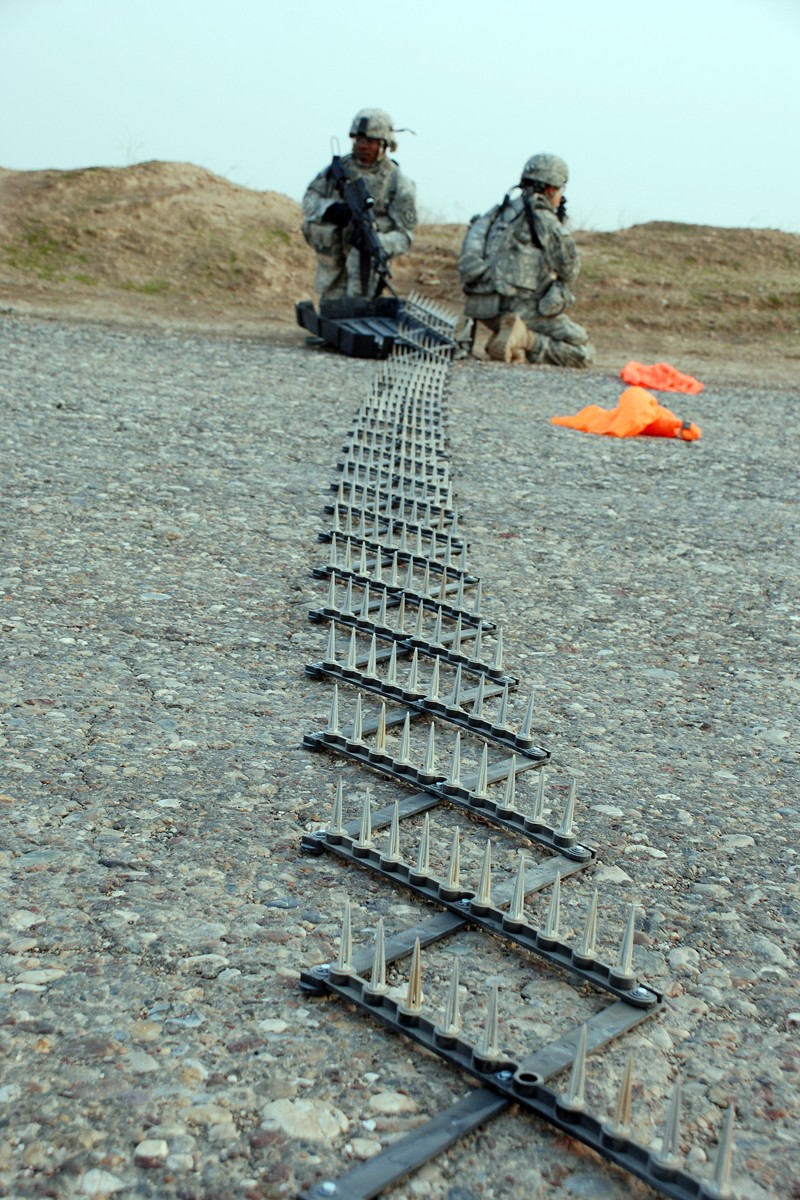FORWARD OPERATING BASE CALDWELL, Iraq - The Pathfinders of Fox Company, 2nd Battalion, 10th Combat Aviation Brigade recently ended a 15-day operation in Diyala province targeted at countering smuggling.
The Pathfinders and their Iraqi Security Forces counterparts formed Task Force Minuteman to support the 5th Squadron, 1st Cavalry Regiment, 1st Brigade, 25th Infantry Division December 26 - January 10 during Operation Blackhawk Pickett.
The unit, which consists mostly of infantrymen, but is rounded out by medics, forward observers and combat engineers, utilized standard infantry tactics with an aviation twist while on mission.
"We were set up to do air-assault traffic control points - we would fly out, set up a traffic control point (TCP) and search vehicles, then fly to another area, set up the TCP and search more vehicles," explained Capt. Jeffrey O'Dell, Fox Company commander. "Regular infantry units set up traffic control points all the time; but to fly to locations and set them up, I would say that's pretty unique."
Another technique the group employed was air-assaulted, dismounted zone patrols into areas that could not be reached by vehicle due to an unforgiving landscape.
"We were able to fly out in the middle of this terrain they can't drive to, and conduct dismounted patrols," O'Dell said. "We'd get dropped off, conduct our patrol, then get picked back up. During the patrols, we looked for caches, caves and rat lines in the terrain that suggest movement."
During the operation, patrol teams walked more than 30 kilometers and uncovered several bunkers, caves, unexploded ordnances (UXOs), an undetonated IED and various drug paraphernalia.
Because continued success in Iraq means winning the trust of its people, the team made sure to engage any members of the local communities they came into contact with while conducting their patrols.
"We'd talk to the locals, see how security in the area is, see how the governance is going, kind of get a general idea if they like Americans or Coalition forces - or the Government of Iraq itself - and what they thought of the upcoming elections," O'Dell explained.
Col. Erik Peterson, 10th CAB commander, said missions like Operation Blackhawk Pickett showcase the extraordinary capabilities of having a Pathfinder unit in an Aviation brigade, a relatively new concept in today's transforming Army.
"Maj. Gen. Mike Oates, the 10th Mountain Division commander, envisioned an agile problem-solving team with unmatched air-ground integration skills when he established the Pathfinder Company last May," Peterson said.
It was this unique combination of Infantry and Aviation assets which led 25th ID Commander Maj. Gen. Robert L. Caslan to select the Pathfinder company for the operation.
"Without driving anywhere, we were able to search vehicles and go places where traditionally it's very challenging to get Coalition forces because of the restrictive terrain," O'Dell said. "When you fly, you can cover great distances in a relatively small period of time, and you can bring an element of surprise to the battlefield, which is useful."
Although they stayed busy, the Soldiers of Fox Company made time to train their Iraqi counterparts on how to integrate helicopters into their tactics, techniques and procedures.
O'Dell said he believes it is important to pass on these unique skills as the Iraqi forces continue to grow and take responsibility for the security of their country.
"These guys are not in their infancy anymore," O'Dell said, "We've seen them performing patrols by themselves all the time, with no Coalition soldiers on the team; what we want to do now is get them out of vehicles and into aircraft."
As the Iraqi Army develops their aviation corps, O'Dell thinks they will see the usefulness of incorporating helicopters into daily operations.
"Right now, the Iraqi Army uses (their aircraft) for battlefield circulation, but I don't think they're quite thinking 'air-assault' yet," he said. "But they're getting there. With how much focus the U.S. military puts on airpower, and now as they see us operating here, I think they'll grasp how important an asset it is."
O'Dell and his men were happy for a chance to use their talents in the operation. With the Pathfinders' main mission in the aviation brigade being downed-aircraft and isolated-personnel recovery teams, not staying busy is both a blessing and a curse.
"It's great that we're not doing our job, because it means we're not losing aircraft or personnel," O'Dell said, knocking on wood. "But it puts us at a disadvantage for not having anything to do."
But with two full platoons in his company, O'Dell is able to divert one platoon to conduct operations while the other is standing by for personnel recovery and downed-aircraft recovery team missions.
"I think we'll probably end up back out (patrolling the border)," he said. "We enjoyed doing it, and missions like this fill the gap without compromising our personnel recovery mission."






Social Sharing